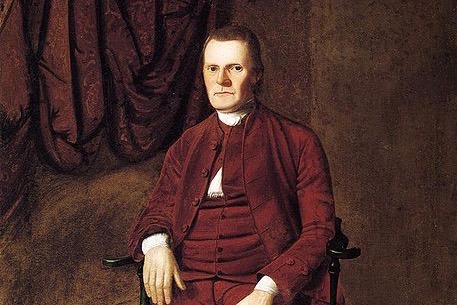
Roger Sherman (1721-1793)
Students will:
- understand Sherman’s contributions to public service
- appreciate Sherman’s role as a leader of the American opposition to British tyranny
- analyze Sherman’s view of the proper division of power between the states and the national government
- understand the reasons for Sherman’s initial opposition to a bill of rights
- explain Sherman’s view of the role of government
Student Handouts
- Handout A—Roger Sherman (1721–1793)
- Handout B—Context Questions
- Handout C—In His Own Words: Roger Sherman on the Role of Government
- Handout D—Excerpts from Roger Sherman, June 6, 1787
Additional Teacher Resource
- Review answers to homework questions.
- Conduct a whole-class discussion to answer the Critical Thinking Questions.
- Ask a student to summarize the historical significance of Roger Sherman.
Roger Sherman was a leader of American opposition to British tyranny in the 1760s and 1770s. He served in the First and Second Continental Congresses and was a member of the committee that drafted the Declaration of Independence. At the Constitutional Convention of 1787, he fought to protect the rights of the states, championing the principle of federalism that was crucial to the American system of government. Sherman had a hand in the creation of the Declaration of Independence, the Articles of Confederation, and the Constitution. He initially opposed adding a bill of rights to the Constitution but later changed his mind and worked to win the approval of Connecticut for the Bill of Rights.
Although not the most charismatic or eloquent Founder, Roger Sherman was highly esteemed by his contemporaries. At Sherman’s death, Ezra Stiles, president of Yale College, wrote, “He was an extraordinary man—a venerable uncorrupted patriot.” A talented politician, Sherman was also a man of deep religious faith who approached life seriously. Thomas Jefferson once claimed that the Connecticut statesman “never said a foolish thing in his life.” A self-made man with the power of common sense and the ability to compromise, Sherman was completely dedicated to public service at both the state and national levels. He had a hand in the creation of the Declaration of Independence, the Articles of Confederation, and the Constitution.
Sherman was an early champion of union first among the colonies and then among the states. He understood the benefits of having a central government that could address national needs and handle international affairs. Sherman jealously guarded the rights of the people of America in general and of Connecticut in particular against encroachments by, first, the government of Great Britain, and, after independence, the government of the United States. A leader of American opposition to British tyranny in the 1760s and 1770s, he served in the First and Second Continental Congresses and was a member of the committee that drafted the Declaration of Independence. At the Constitutional Convention of 1787, he fought to protect the rights of the states, thereby lending support to the principle of federalism that was crucial to the American system of government.
Conduct a whole-class discussion about Sherman’s view of the role of government.
- In 1787, what did he say about the roles of the federal and state governments?
- Today, what would Sherman say about the roles of government listed on the board?
- Why do you think the role of government has expanded since 1787?
See Answer Key.
- Have the students find a news article that illustrates the federal government fulfilling a role of which Sherman approved. Have the students write a one-paragraph essay from Sherman’s point of view, explaining how the government is properly fulfilling this role.
- Have the students find a news article that illustrates the federal government fulfilling a role of which Sherman might have disapproved. Have the students write a one paragraph essay from Sherman’s point of view, explaining how the government is exceeding its proper role.
Have the students select a contemporary problem and research how the federal, state, or local government responded to that problem. Then have them write a two- to three page paper in which they (1) recommend which level of government—if any—should address that problem and (2) state how the problem should be addressed. Topics for research could include the following:
- Pollution
- Lack of medical care
- Failing schools
- Crime
- Terrorism
